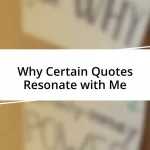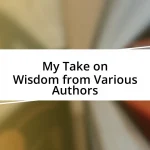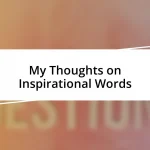Key takeaways:
- Villains often reflect deeper human truths, showcasing complexities that challenge our moral understanding and invite empathy.
- Lessons from iconic villains include the power of determination (e.g., Darth Vader), the dangers of obsession (e.g., Gollum), and the consequences of choices (e.g., Walter White).
- Engaging with villains can facilitate personal reflection, urging us to confront our values, fears, and the potential for redemption.
- Transforming fear into strength is a recurring theme, where understanding and acknowledging our darker emotions inspire personal growth and resilience.
![]()
Understanding the Essence of Villains
Villains often serve as a dark mirror, reflecting deeper truths about humanity. I remember watching a classic movie where the antagonist revealed a tragic backstory that made me realize even villains are shaped by their experiences. Have you ever found yourself empathizing with a character you thought was purely evil, only to discover their motivations were rooted in pain or loss?
At times, I find it fascinating how iconic villains challenge our understanding of morality. They compel us to ask tough questions: What drives someone to commit heinous acts? I vividly recall a discussion with friends about a villain we all loved to hate; we couldn’t help but analyze their complex personality and the murky moral waters they navigated. It’s moments like these that make me appreciate the rich, layered construction of a well-written villain.
Furthermore, engaging with these characters pushes us to explore our own fears and desires. The thrill they bring often stems from their unapologetic nature, which can be oddly liberating. Have you thought about how a villain’s unwavering conviction might resonate with your own struggles? I’ve often left a movie not just feeling entertained but reflecting on my values, pushing me to confront the uncomfortable truths lurking within myself.
![]()
Lessons from Famous Villains
Villains teach us about determination and the power of belief in one’s convictions. Take Darth Vader, for instance. His unwavering commitment to his cause—even one that was ultimately destructive—always made me consider the impact of passion on our lives. Have you ever admired someone for their tenacity, despite the ethics involved?
Another significant lesson I’ve gleaned from famous villains is the importance of understanding one’s vulnerabilities. Characters like Gollum from “The Lord of the Rings” illustrate how obsession can lead to one’s downfall. Reflecting on Gollum’s internal struggle made me re-evaluate my own life; what am I holding onto that might harm me? It’s a humbling realization that even the strongest among us can be weakened by deeper issues.
Finally, iconic villains embody the consequences of choices—good or bad. I vividly recall the nuanced portrayal of Walter White in “Breaking Bad.” It was sobering to watch a smart, talented man descend into darkness driven by pride. His journey constantly reminds me that our decisions shape our destinies. It raises a critical question: How often do we consider the long-term effects of our choices in pursuit of success?
| Villain | Lesson |
|---|---|
| Darth Vader | The power of belief and determination |
| Gollum | The danger of obsession and vulnerability |
| Walter White | The consequences of our choices |
![]()
Psychology Behind Villainous Characters
The psychology behind villainous characters offers fascinating insights into the human psyche. I often find myself intrigued by how their actions, often seen as evil, are filtered through layers of trauma and desire. For instance, reflecting on characters like the Joker makes me think of how chaos can stem from a deep sense of isolation and betrayal. It evokes emotions I didn’t anticipate, prompting me to ponder the societal factors that contribute to such darkness.
- Villains often embody the struggle for power and control, showcasing what happens when someone feels powerless in their own life.
- They can represent our inner conflicts, revealing the parts of ourselves we fear to acknowledge.
- Many villains display traits associated with psychological disorders, providing a distorted yet compelling lens on mental health.
- Their backstories frequently expose societal failures, encouraging a dialogue on empathy and understanding.
I recall a moment when I was discussing the complexities of these characters with a friend. We found that even the most iconic villains often reflect real-world issues, like the impact of childhood trauma or social alienation. This realization was profound for me; it reminded me of the importance of empathy in understanding the darker sides of human nature. Engaging with these villains has repeatedly urged me to confront uncomfortable truths about not just the characters, but myself as well.
![]()
Attributes that Make Villains Iconic
When I think about what makes villains iconic, one clear attribute stands out: their complexity. Take Hannibal Lecter, for example. He’s not just a monster; he’s charismatic and intelligent, which makes his evil even more chilling. Watching him navigate social situations, there’s a part of me that wonders—what draws people to individuals who possess such dark charm?
Another essential characteristic is their unwavering resolve. Villains often embody a single-minded focus on their goals, like Magneto in the X-Men series. His drive stems from a deep-rooted belief in his cause, which resonates with me on a personal level. Have you ever felt so passionate about something that you were willing to sacrifice everything for it? That intensity often inspires admiration, despite the unethical path taken.
Finally, iconic villains frequently serve as mirrors to our own fears and desires. Characters like Lady Macbeth reveal our inner struggles with ambition and guilt. When I first delved into her psyche, I felt a strange mix of horror and understanding—as if she was revealing parts of myself I’d rather keep hidden. Why is it that we are drawn to explore the dark aspects of human nature? Engaging with these characters forces us to confront uncomfortable emotions and question our moral boundaries.
![]()
Embracing the Complexity of Villains
Villains are often layered with complexities that make them more than just antagonists; they mirror our own struggles and fears. I remember watching “Breaking Bad” and feeling a strange kinship with Walter White. As he transformed from a meek chemistry teacher into a ruthless drug lord, I found myself questioning what choices lead someone to embrace darkness. Isn’t it fascinating how a character can evoke empathy despite their heinous actions?
There’s something compelling about how these villains challenge our moral compass. When I think of characters like Loki from the Marvel universe, I can’t help but admire his mischievous nature, despite his betrayal and manipulation. In a way, he embodies that little voice we all have—the desire to break free from expectations and embrace chaos. Have you ever felt that urge to rebel against the norm? It’s a powerful draw that leaves me pondering the thin line between heroism and villainy.
In exploring the complexity of villains, I’ve learned that they can teach us valuable lessons about ourselves. I recall discussing with my sister how Darth Vader’s eventual redemption arc sparked deep conversations about forgiveness and redemption. It made me realize that understanding someone’s journey, no matter how twisted, can lead to greater compassion. Isn’t it enriching to explore both light and darkness in our quest for self-awareness? Embracing the complexity of villains invites us to reflect on our choices and the human experience in all its shades.
![]()
Applying Villain Lessons in Life
Applying lessons from iconic villains has been an eye-opener for me. I remember a time when I took a bold step similar to a villain’s fierce determination. In a crucial career moment, I channeled my inner Magneto, refusing to back down from a project everyone doubted. I realized that sometimes, unwavering resolve, even when it feels a little villainous, can push us to achieve remarkable things.
Then there’s the lesson of embracing complexity. I often think of characters like The Joker, who remind us that life isn’t black and white. While I’ve struggled with my own darker thoughts, I’ve learned the importance of acknowledging them instead of suppressing them. Isn’t it liberating to explore the depths of our emotions? I’ve found that being honest about my fears and desires has offered incredible insight into my motivations, much like how The Joker’s antics challenge societal norms.
Finally, the idea of redemption is powerful. I experienced a moment of forgiveness that mirrored Darth Vader’s transformation. After a falling out with a friend, we had an emotional conversation where we both laid bare our insecurities. This encounter taught me that everyone has a backstory, even those who hurt us. Isn’t it humbling to realize that understanding rather than judgment can lead to healing? Like Vader, we all possess the potential for change, making the journey of life even more profound.
![]()
Transforming Fear into Strength
Transforming fear into strength is a profound realization I’ve encountered through various villain narratives. I think back to how the character of Maleficent, often portrayed as a wicked fairy, sparked a significant shift in my perspective. It wasn’t merely her fierce exterior that left an impression; it was her backstory that revealed how betrayal can fuel one’s fierceness. Have you ever felt that your own fears transformed into a source of motivation? I certainly have, especially when faced with challenging situations where I had to channel my inner strength rather than succumb to paralyzing anxiety.
In moments of doubt, I often recall the journey of characters like Killmonger from “Black Panther.” Here’s a villain molded by personal loss and societal rejection. When I watched him express his pain and fight for what he believes in, it resonated with my own battles against fear of failure. Turning fear into a fire that ignites passion is no easy feat, but witnessing his journey inspired me to harness my anxieties. How often do we allow fear to hold us back instead of using it as a catalyst for growth?
I’ve had my share of fears, especially when stepping out of my comfort zone. Remembering my nerves before presenting at a big conference reminds me of Poison Ivy’s fierce stand against environmental destruction. Even though I felt afraid, I realized that embracing that fear allowed me to speak with conviction. Instead of hiding from it, I turned it into power. Has fear ever made you feel like you couldn’t act? I found empowerment in acknowledging that fear can be a companion on the path to strength, pushing us toward something greater.












